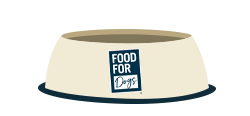
Dogs are no longer pets that sleep outside in a kennel and which we interact with intermittently, such as when taking them for a walk. Our four-legged friends have become companions and members of the family that we share many parts of our lives with including having them sleep inside.
However, sharing our homes with them, doesn’t mean that we can share our human food with them.
It is in your dog’s nature to try and get you to share your food with it – much as it would do from the lead dog in a wild pack. And dogs have a great talent for dialling up the cuteness factor, making it hard to resist giving them a little treat off your plate.
But caution is advised. Many of the foods that are in our homes, while easily digested by humans, can be toxic to, or cause health issues in, your dog.
Some foods that should never be given to you dog include:
- Chocolate: chocolate contains a number of toxins including theobromine. Dogs aren’t able to easily metabolise theobromine; their bodies process it at a much slower rate which allows levels to accumulate in their system. Once levels of theobromine reach toxic levels it can start to affect the respiratory system, cardiovascular system, central nervous system and kidneys producing a range of symptoms that are distressing both to the dog and their owner, including vomiting, diarrhoea, increased thirst, and in severe cases muscle tremors and seizures.
- Grapes and raisins: the exact toxic substance and the quantity within grapes and raisins is unknown, but ingestion of just a small number of grapes can lead to acute kidney failure.
If you are worried or suspect that your dog may have eaten something it shouldn’t have call your vet immediately as early medical intervention can make all the difference in a case of food toxicity.
This doesn’t mean that all human food is off limits; in fact, there are some human foods that are fine for your dog to eat in moderation.
- Apples – ensure you take out the seeds and core before giving apple slice to your dog
- Green beans – can be given either raw or cooked
- Carrot – can be given either raw or cooked
- Peanut butter – as a special treat, make sure that there is no added sugar or artificial sweeteners used.
Better still use treats that have been specifically developed for dogs and which will not only be safe for them to eat but also nutritious.


